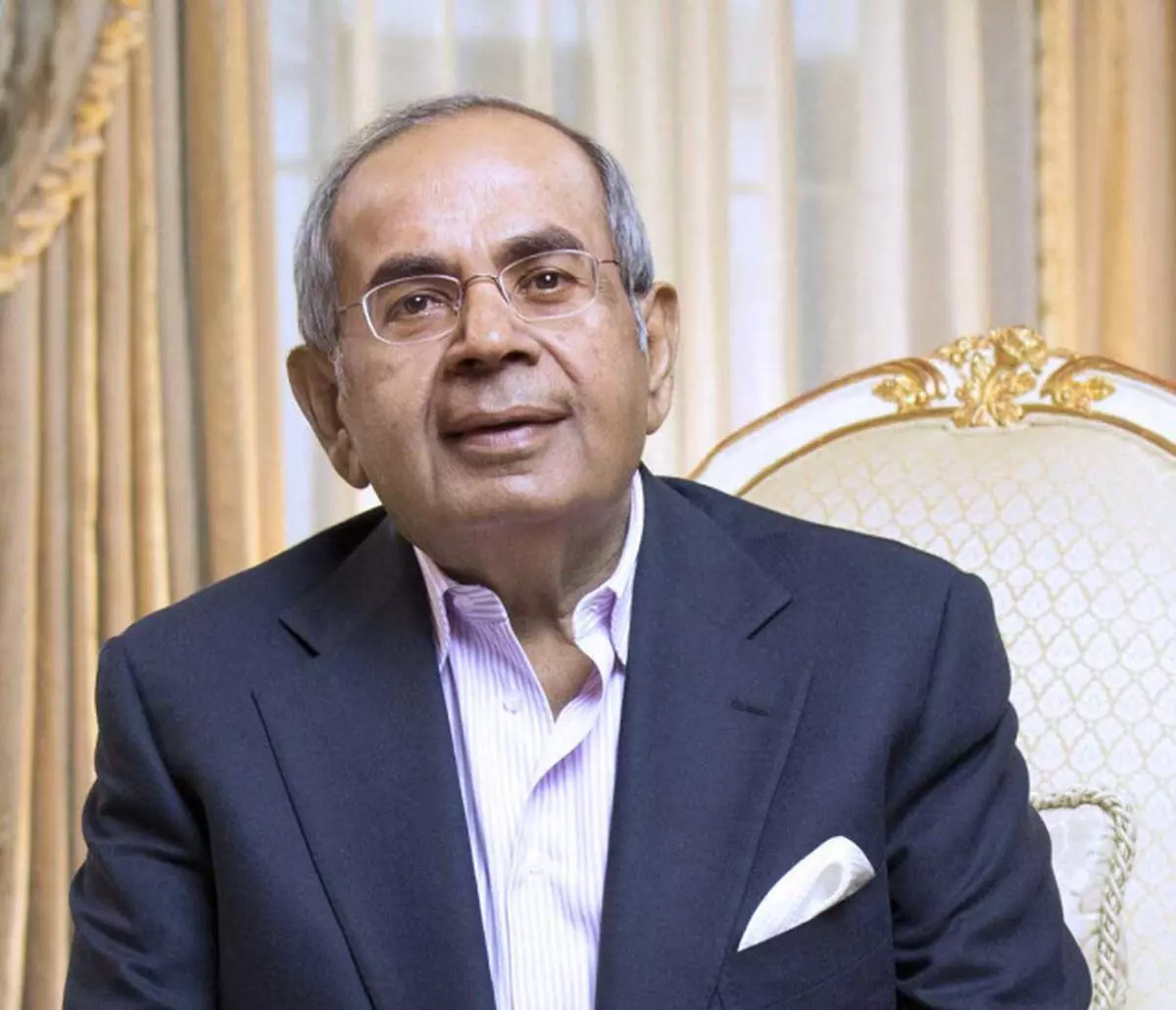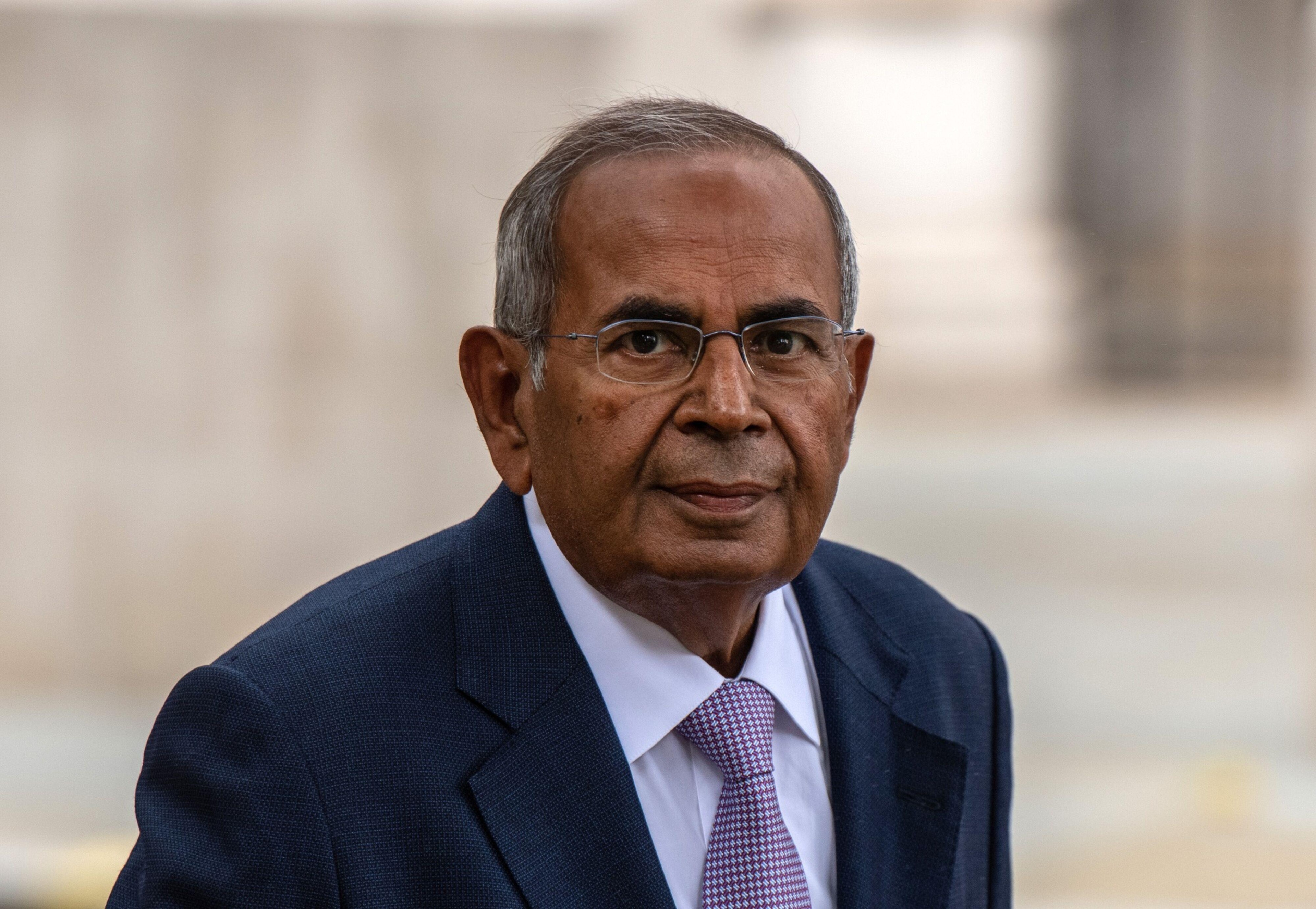Gopichand P. Hinduja



Early Life & Background
- Gopichand P. Hinduja was born in 1940 (in what was then British India, in Sindh). (The Indian Express)
- He belonged to the family of Parmanand Deepchand Hinduja, who started a trading business (carpets, tea, spices) in 1914/1919 after moving from Sindh to Iran. (Jagranjosh.com)
- Gopichand joined the family business in Mumbai in 1959. (Jagranjosh.com)
- He obtained an education in India (graduated from Jai Hind College) and later received honorary doctorates — Law from the University of Westminster, and Economics from Richmond College, London. (www.ndtv.com)
Business Career & the Hinduja Group
- The Hinduja Group began as a modest Indo-Middle-East trading operation. Under Gopichand and his brothers, it expanded into a global diversified conglomerate. (The Indian Express)
- Key acquisitions under his influence:
- Gulf Oil International in 1984. (Jagranjosh.com)
- Ashok Leyland in 1987 — described as one of the most successful turnaround stories. (mint)
- The Group has interests across many sectors: automotive, banking & finance, energy/infrastructure, real estate, media/entertainment, healthcare, etc. (The Times of India)
- Under his leadership, the group moved its base to London (1970s/’79) and has major real estate holdings (see Real-Estate section). (Jagranjosh.com)
- He assumed the Chairman role of the Group in May 2023 after the passing of his elder brother Srichand P. Hinduja. (The Financial Express)
Family & Structure
- Gopichand was one of four Hinduja brothers: Srichand (eldest), Gopichand, Prakash, and Ashok. (Jagranjosh.com)
- He is survived by his wife, Sunita Hinduja; two sons (Sanjay & Dheeraj); and a daughter, Rita. (mint)
- The business and wealth are structured as a family conglomerate, with wide geographic spread (UK/Europe/India) and operations across many industries.
Net Worth & “UK’s Richest Family”
- The family has consistently topped the Sunday Times Rich List for the UK, being rated the richest family in the UK. (www.ndtv.com)
- As of 2025, their collective net worth was reported at about £35.3 billion. (The Times of India)
- Forbes put his individual net worth at around US$20.6 billion (August 2025). (mint)
Real Estate & Other Assets
- Notable UK real estate holdings:
- An 18th-century mansion on Carlton House Terrace, near Buckingham Palace (~67,000 sq ft). (ETHRWorld.com)
- The historic Old War Office building in Whitehall, London — redeveloped into luxury apartments/hotel. (www.ndtv.com)
- The family’s global footprint is large: the business operates in dozens of countries and employs ~150,000-200,000 people globally. (The Independent)
Controversies & Challenges
- In 2001, Gopichand Hinduja was involved in a UK-passport controversy: he reportedly wrote to minister Peter Mandelson about a UK passport for his brother Prakash, after the family’s charity donated £1 million to the Millennium Dome project. (The Independent)
- A Swiss court in 2024 convicted four members of the Hinduja family (Prakash, his wife, son Ajay, daughter-in-law) for exploiting staff at their Geneva estate (illegal employment/exploitation). (Business Insider)
- Internal family disputes over asset ownership and trusts have been reported. (ETHRWorld.com)
Death & Legacy
- Gopichand Hinduja passed away on 4 November 2025 in London at the age of 85 after a prolonged illness. (www.ndtv.com)
- His passing marks a milestone in the family’s succession planning and the leadership structure of the Hinduja Group. It’s not fully clear publicly who will take full operational control. (The Standard)
- His legacy: building a global Indian-origin business dynasty, pioneering cross-border NRI investment (e.g., Ashok Leyland acquisition), and expanding into multiple sectors.
Why This Family Stands Out
- Indian-origin family but resident and active in the UK/Europe — illustrative of globalised business families.
- Diversified business portfolio which mitigates risk and allows global scale.
- Real estate & landmark assets add to their visibility and prestige.
- Their presence in the Sunday Times Rich List consolidates their public profile as “UK’s richest family”.
- Here are two major case-studies involving the Gopichand P. Hinduja (often called “GP”) and the Hinduja family (the UK’s richest family), followed by some commentary on what these cases reveal (for business strategy, governance, ethics, globalisation).
Case Study 1: Building the Global Empire
Overview
- GP joined the family business (which his father Parmanand Deepchand Hinduja founded) in Mumbai in 1959. (India Today)
- Over decades, the family transformed the business from a trading firm (carpets, tea, spices) into a global conglomerate operating in many sectors and countries. (www.ndtv.com)
- GP and his brothers moved the group base to London in the 1970s/1979, which gave access to UK/European finance, real-estate, and global headquarters. (The Times of India)
- The family has topped the UK’s The Sunday Times Rich List for multiple years (2025 net worth ~£35.3 billion) under GP’s leadership. (The Independent)
- Example of a strategic acquisition: the purchase of Ashok Leyland (1987) and other diversified interests to scale the business. (ETHRWorld.com)
Why this is a notable case
- Globalisation & diaspora entrepreneurship: An Indian-origin business family establishing deep roots in the UK and globally shows how capital, talent and strategy cross borders.
- Diversification & transition: The shift from trading commodities to energy, automotive, banking, real-estate allowed risk spreading and scale.
- Strategic location choice: London as base gave regulatory, reputation, finance, real‐estate advantages.
- Wealth creation at scale: The family’s rise from modest business to one of the top wealth holders in the UK.
Key lessons
- Having a global mindset early pays: moving to London expanded options.
- Diversification helps mitigate single-sector risk (trading vs energy vs infrastructure).
- Real-estate can serve both as business asset and prestige / strategic store of value.
- The transition from generation to generation is delicate (see Case Study 2).
Case Study 2: Governance, Family Disputes & Ethical Risks
Governance & succession issues
- After the death of eldest brother Srichand P. Hinduja in 2023, GP became Chairman of the family group. (India Today)
- Reports indicate that internal disputes emerged: for instance a 2014 letter signed by the four brothers (GP, Srichand, Prakash, Ashok) saying “assets held by one of them belonged to all”, but later renegotiated. (www.ndtv.com)
- This kind of intra-family share of assets scheme, while intended to preserve unity, can cause complications around control, transparency, and succession.
Ethical/legal risk – exploitation of staff
- In 2024 a Swiss court convicted four members of the Hinduja family (among them Prakash Hinduja and his wife, and their son & daughter in law) for exploiting domestic staff at their Geneva estate. (South China Morning Post)
- Key facts:
- The workers were brought from India, paid vastly below Swiss wage standards (e.g., as little as 7 Swiss francs/day). (The Economic Times)
- Passports allegedly withheld; movement restricted; long hours (up to 18 hours/day). (South China Morning Post)
- The family defended that the employees were free and benefits were provided; the court accepted exploitation though not human trafficking charges. (Khaleej Times)
- The case is significant because it involves the richest family in the UK and yet shows vulnerabilities of ultra-wealthy business families to ethical & governance failings.
Why this is a notable case
- It shows that vast wealth and global operations do not exempt a family or group from scrutiny, legal risk, reputational damage.
- Global operations mean local jurisdictions matter: while the Hinduja Group is headquartered in London, the Swiss court jurisdiction applied to activities in Geneva.
- The internal governance (family vs management, visibility, compliance) is tested when there are diverse geographies and family members.
- It raises questions of how oversight, transparency and worker protection apply in ultra-wealthy households with complex structures.
Key lessons
- Business success does not guarantee ethical business conduct; neglecting worker rights, or failing corporate governance, invites legal/regulatory consequences.
- Family firms must ensure clear lines of accountability, transparency (especially when crossing jurisdictions).
- Reputational risk: for a globally known family, a legal case like this can erode trust, impact brand, stakeholder relations.
- Succession & governance: a family with few public disclosures may face internal conflict, which can distract from business and expose subjects to more risk.
Commentary: Broader Reflections
- Wealth & Power Imbalance
The Hinduja case repeatedly highlights huge imbalances: a family worth tens of billions, yet staff suspected of being paid extremely low wages in one jurisdiction. This prompts questions about how wealth enables power dynamics and the responsibility that comes with it. - Globalisation of Family Firms
The Hinduja family is illustrative of globalised family firms: multiple countries, multiple sectors, cross‐border assets, diaspora roots. With that comes complexity: tax regimes, regulation, labor law, property law across jurisdictions. The upside is scale; the risk is fragmentation and regulatory exposure. - Invisible Governance vs Public Scrutiny
GP was relatively private, the family operated behind the scenes. In modern business environment, even ultra-wealthy families face public scrutiny, media, legal oversight. A low-profile strategy may shield you but doesn’t exempt you from consequences once a problem surfaces. - Succession, Family Unity, and Business Continuity
The letter among brothers about “everything belongs to everyone” is admirable as a principle, but in practice it may lead to ambiguity in control, dilution of decision-making, or conflicts. The case shows that family unity and clarity of governance (boards, rules, ownership) matter even more when scale is high. - Ethics and Social Licence
For a conglomerate with huge reach and employees (~200,000+ globally according to reports). (The Times of India) The actions in one corner of the business (or family household) can impact the entire group’s social licence. Firms today must align wealth creation with ethical responsibilities (employee welfare, human rights, local community). - Real-Estate & Legacy Investments
The family’s London real-estate (e.g., 18th-century mansion by Buckingham Palace; Old War Office redevelopment) contribute to prestige and stability. (ETHRWorld.com) But real-estate also draws high visibility (and thus higher scrutiny) especially in cities like London concerning planning rules, affordable housing, heritage issues. - Transparency and Public Perception
When a family is labelled “UK’s richest family” and their figure appears in public rich-lists regularly, there is greater expectation of corporate citizenship. Failures or scandals get amplified. The Swiss case shows how even behind‐the-scenes activities become subject to public debate on inequality and justice.
Final Thoughts
The Hinduja family and Gopichand Hinduja’s story is a rich case (pun intended) for multiple themes: how to build global business empires from modest origins, how diversification and location strategy support growth, but also how governance, ethics, family dynamics and global regulation matter intensely.
